Family-Based Substance Use Treatment
This grant program provided funding for state and local government agencies and federally recognized tribal communities to implement or expand treatment programs that provided comprehensive substance use treatment and other services for incarcerated parents of minor children and their family members. The U.S. Department of Justice’s Bureau of Justice Assistance (BJA) administered the awards.
Objectives and Deliverables
This program sought to increase public safety and reduce recidivism through comprehensive responses to people in prison and jail and their families. Allowable uses for this award included:
- Use of screening and assessment to determine criminogenic risk and needs;
- Treatment interventions that targeted criminal thinking, especially for higher-risk people;
- Provision of evidence-based substance use and mental health treatment practices and services both before and after release;
- Comprehensive services to address family needs, such as family counseling, legal services, medical care, respite care and mutual support services, child maltreatment prevention, mental health services, nursery and preschool, parenting skills training, transportation, and vocational training; and
- Transition planning and linkages to reentry services and benefits.
For more information, see the most recent BJA grant solicitation from 2012.
Past Grantees
BJA awarded 40 grants through this program: 23 state and local grants in 2010; 1 tribal and 11 state and local grants in 2011; and 5 state and local grants in 2012.
A positive school experience, where a child feels secure, is essential for their well-being. However, for many children…
Read MoreWhen returning to their communities from criminal justice settings, people with behavioral health needs face barriers in accessing…
Read More Supporting Children of Incarcerated Parents: Reimagining School and Community Collaboration
Supporting Children of Incarcerated Parents: Reimagining School and Community Collaboration
A positive school experience, where a child feels secure, is essential for their well-being. However, for many children with incarcerated parents—one in 14 in the U.S.—school can feel far from safe due to stigma, trauma, and a lack of understanding.
Read More Bridging Communities and Correctional Systems: Q&A with CSG Justice Center Advisory Board Member Commissioner Nicholas Deml
Read More
Bridging Communities and Correctional Systems: Q&A with CSG Justice Center Advisory Board Member Commissioner Nicholas Deml
Read More
 Assigned to the Cloud Crew: The National Incarceration Association’s Hybrid Case Management for People with Behavioral Health Needs
Assigned to the Cloud Crew: The National Incarceration Association’s Hybrid Case Management for People with Behavioral Health Needs
When returning to their communities from criminal justice settings, people with behavioral health needs face barriers in accessing basic needs—including food, housing, employment, transportation, education, clothing, and substance use and mental health services—which increases their risk of experiencing a crisis.
Read More Meet the Medicaid and Corrections Policy Academy Mentor States
Meet the Medicaid and Corrections Policy Academy Mentor States
New Hampshire Department of Corrections Commissioner Helen Hanks presents at the Medicaid and Corrections Policy Academy in-person meeting.
Read More Taking the HEAT Out of Campus Crises: A Proactive Approach to College Safety
Taking the HEAT Out of Campus Crises: A Proactive Approach to College Safety
The sharp rise in school shootings over the past 25 years has led school officials across the U.S. to take a closer look at ways to keep students safe. For Chaffey College in Rancho Cucamonga, California, a tragic incident at a nearby university hit close to home and spurred campus leaders to revisit their own school’s threat assessments and crisis responses.
Read More










